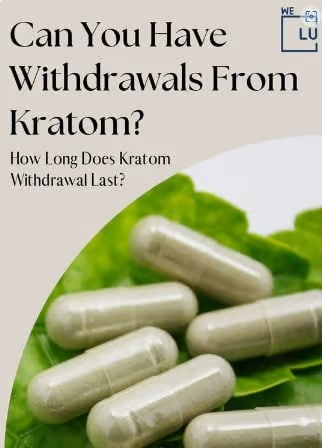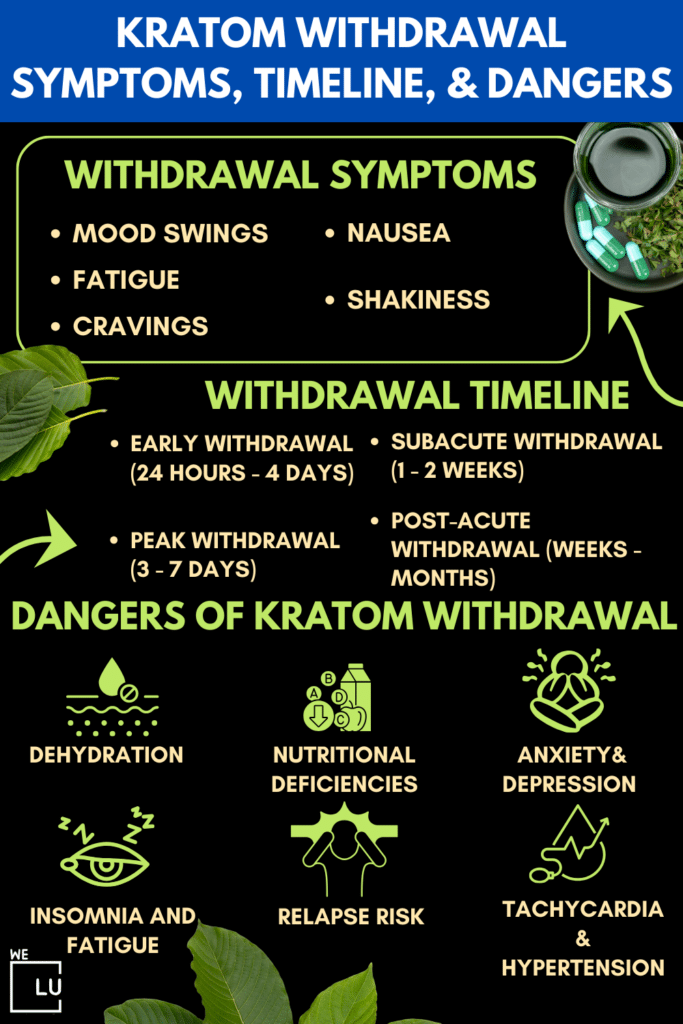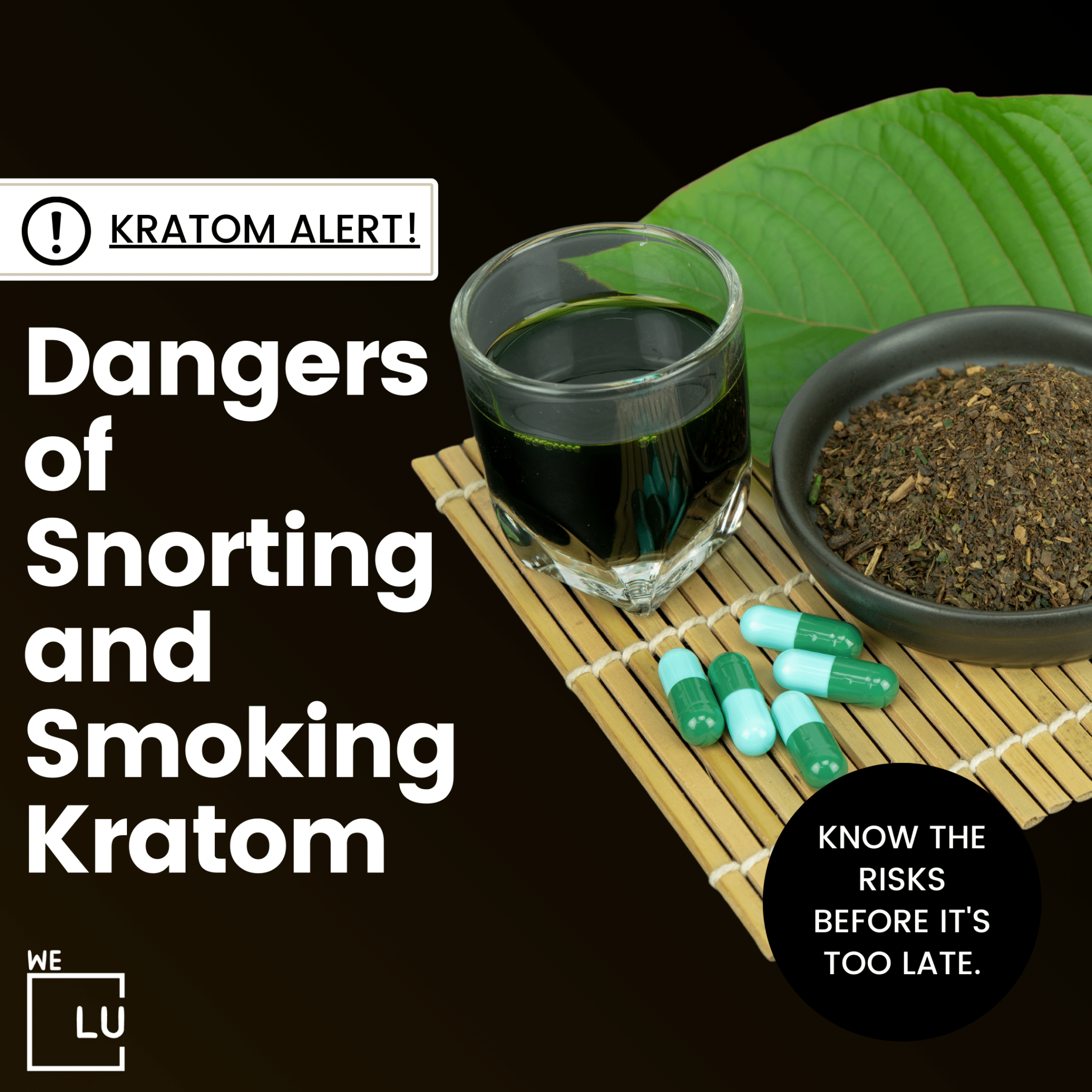Embarking on the journey of dealing with kratom withdrawal can be a challenging and transformative experience. Whether prompted by a desire for a substance-free life or the recognition of dependency issues, navigating through withdrawal symptoms requires a comprehensive and individualized approach.
If you or someone you know is grappling with kratom addiction and withdrawal, remember that help is available. Call We Level Up CA today, where we are ready to offer support, guidance, and a tailored plan to navigate the challenges of kratom withdrawal and pave the way towards a healthier, more fulfilling life. Your journey to recovery starts with a simple call – take the first step towards a brighter future.
What Is Kratom Withdrawal?
Kratom withdrawal refers to the set of symptoms that individuals may experience when they abruptly stop or reduce their intake of kratom, a tropical tree native to Southeast Asia. Kratom leaves contain compounds that can produce psychotropic (mind-altering) effects, and it is commonly used for its stimulant and opioid-like properties.
While not everyone who uses kratom experiences withdrawal symptoms, some individuals may develop dependence over time, especially with frequent and prolonged use.
Kratom Withdrawal Symptoms
Kratom withdrawal symptoms can vary in intensity and duration, and they may include both physical and psychological effects. Common kratom withdrawal symptoms include:
- Mood Swings: Users may experience irritability, anxiety, mood swings, and even depression during withdrawal.
- Muscle Aches and Pains: Physical discomfort, including muscle aches and joint pain, is a common symptom.
- Gastrointestinal Distress: Nausea, vomiting, diarrhea, and abdominal cramps are reported by some individuals undergoing withdrawal.
- Sleep Disturbances: Insomnia or changes in sleep patterns are common, and individuals may struggle with getting restful sleep.
- Fatigue: Many people experience fatigue and a lack of energy during kratom withdrawal.
- Tremors and Sweating: Some individuals may experience tremors, shakiness, sweating, and hot flashes.
- Cravings: Users may have intense cravings for kratom during withdrawal, making it challenging to quit.
- Anhedonia: A diminished ability to experience pleasure or interest in once enjoyable activities is a psychological symptom that may occur.
Withdrawal symptoms can vary widely between individuals; not everyone will experience the same symptoms. Additionally, the duration and intensity of withdrawal can depend on factors such as the individual’s overall health, the duration of kratom use, and the dosage.
Kratom Withdrawal Timeline
The timeline for kratom withdrawal can vary from person to person, and it depends on factors such as the individual’s physiology, the amount and duration of kratom use, and whether they quit abruptly or taper off gradually. Generally, the withdrawal process can be divided into several stages, each with its symptoms. Keep in mind that the following timeline is a general guideline, and individual experiences may differ:
- Early Withdrawal (24 hours to 4 days):
- Within the first 24 hours after discontinuing kratom, individuals may start to experience early withdrawal symptoms.
- Symptoms during this stage may include anxiety, irritability, mood swings, muscle aches, and cravings for kratom.
- Peak Withdrawal (3 to 7 days):
- The peak of withdrawal symptoms typically occurs within the first week after cessation.
- Physical symptoms may intensify, including gastrointestinal issues (nausea, vomiting, diarrhea), sweating, tremors, and fatigue.
- Psychological symptoms such as depression and anxiety may become more pronounced.
- Subacute Withdrawal (1 to 2 weeks):
- After the initial peak, symptoms may gradually begin to subside.
- Physical discomfort and psychological symptoms may diminish, although residual effects may persist.
- Post-Acute Withdrawal (weeks to months):
- Some individuals may experience lingering symptoms for weeks to months after the acute withdrawal phase.
- Symptoms during this stage are often milder but can include mood swings, fatigue, and difficulty concentrating.
If someone is considering quitting kratom, especially if they have been using it regularly or in high doses, they should consult with a healthcare professional to create a personalized plan for cessation and withdrawal management. abruptly stopping kratom use can lead to more severe withdrawal symptoms so that a gradual tapering approach may be recommended in some cases.

Skip To:
Learn More:
- Kratom Side Effects Long-Term And Short-Term Side Effects.
- Is Kratom An Opioid? Can You Use Kratom For Opioid Withdrawal?
- Kratom Drug Addiction Overdose, Detox & Treatment
- What is the Most Addictive Drug? Top 10 Most Addictive Drugs, Cocaine, Heroin, Alcohol & More
- What does withdrawal mean? Symptoms, Causes, Types, Treatment & Medications

Get Your Life Back
Find Hope & Recovery. Get Safe Comfortable Detox, Addiction Rehab & Dual Diagnosis High-Quality Care.
Hotline (855) 695-1160Dangers Of Kratom Withdrawal
While kratom withdrawal is generally considered less severe than withdrawal from substances like opioids, it can still present challenges and discomfort for individuals who have developed dependence. Some potential dangers and complications associated with kratom withdrawal include:

- Dehydration: Diarrhea and vomiting are common symptoms during kratom withdrawal, and these can lead to dehydration. It’s important for individuals undergoing withdrawal to stay hydrated by drinking plenty of fluids.
- Nutritional Deficiencies: Loss of appetite and gastrointestinal distress can contribute to a reduced food intake, potentially leading to nutritional deficiencies. Maintaining a balanced diet or taking supplements may help address this concern.
- Psychological Effects: Kratom withdrawal can be associated with mood swings, anxiety, and depression. In some cases, individuals may be at risk of self-harm or other mental health issues. Seeking support from mental health professionals is crucial.
- Insomnia and Fatigue: Sleep disturbances are common during kratom withdrawal, and chronic sleep deprivation can contribute to fatigue and impact overall well-being. Adequate rest and sleep hygiene practices are essential.
- Relapse Risk: Cravings for kratom can be intense during withdrawal, and the risk of relapse is a concern. Individuals may be tempted to resume kratom use to alleviate withdrawal symptoms, especially if they are not receiving appropriate support.
- Tachycardia and Hypertension: In some cases, withdrawal from kratom may be associated with an increase in heart rate (tachycardia) and elevated blood pressure (hypertension). Individuals with pre-existing cardiovascular conditions should be cautious.
Get Help. Get Better. Get Your Life Back.
Searching for an Accredited Drug and Alcohol Rehab Centers in Near You?
Even if you have failed previously and relapsed, or are in the middle of a difficult crisis, we stand ready to support you. Our trusted behavioral health specialists will not give up on you. When you feel ready or just want someone to speak to about therapy alternatives to change your life call us. Even if we cannot assist you, we will lead you to wherever you can get support. There is no obligation. Call our hotline today.
FREE Addiction Hotline – Call 24/7Kratom Detox & Tapering
Detoxification from kratom, like any substance, is a process that should ideally be done under the guidance of healthcare professionals, especially if the individual has been using kratom regularly or in large amounts. Detoxification can be achieved through different methods, including tapering and medical supervision. Here are some considerations for kratom detox and tapering:
- Tapering:
- Gradual Reduction: Tapering involves gradually reducing the dose of kratom over time instead of quitting abruptly. This helps minimize the intensity of withdrawal symptoms.
- Individualized Plan: A healthcare professional can create an individualized tapering plan based on the person’s usage patterns, overall health, and withdrawal symptoms.
- Monitoring: Regular monitoring and adjustment of the tapering schedule may be necessary to ensure a comfortable and effective withdrawal.
- Medical Supervision:
- Consultation with Healthcare Professionals: Before starting any detoxification process, it’s advisable to consult with healthcare professionals, including addiction specialists or doctors experienced in substance use disorders.
- Monitoring Vital Signs: Medical supervision for monitoring vital signs, such as heart rate and blood pressure, which can be affected during withdrawal.
- Supportive Measures:
- Hydration and Nutrition: Maintaining hydration and proper nutrition is essential during detoxification to address potential dehydration and nutritional deficiencies.
- Symptom Management: Healthcare professionals may recommend over-the-counter or prescription medications to manage specific withdrawal symptoms, such as nausea, insomnia, or anxiety.
- Psychological Support:
- Counseling and Therapy: Psychological support, including counseling or therapy, can be beneficial during detoxification to address the emotional and psychological aspects of addiction.
- Support Groups: Joining support groups or seeking help from friends and family can provide additional encouragement and understanding.
- Aftercare:
- Long-Term Support: Detoxification is just the first step. Long-term support, including counseling, therapy, or participation in support groups, can be crucial for maintaining recovery.

Individual responses to detoxification methods can vary, and what works for one person may not be suitable for another. Seeking professional guidance ensures a personalized approach based on individual circumstances.
First-class Facilities & Amenities
World-class High-Quality Addiction & Mental Health Rehabilitation Treatment
Rehab Centers TourRenowned California Addiction Center. Serene Private Facilities. Inpatient rehab programs vary.
Addiction Helpline (855) 695-1160Proven recovery success experience, backed by a Team w/ History of:
15+
Years of Unified Experience
100s
5-Star Reviews Across Our Centers
10K
Recovery Success Stories Across Our Network
- Low Patient to Therapist Ratio
- Onsite Medical Detox Center
- Comprehensive Dual-Diagnosis Treatment
- Complimentary Family & Alumni Programs
- Coaching, Recovery & Personal Development Events
Can The Effects Of Kratom Withdrawal Be Reversed?
The effects of kratom withdrawal can be managed and alleviated, but complete reversal depends on various factors, including the severity of dependence, duration of use, and individual differences. Kratom withdrawal symptoms can be uncomfortable, but they are generally not life-threatening.

Here are some approaches to manage and potentially reverse the effects of kratom withdrawal:
- Tapering: Gradual reduction of kratom dosage can help minimize withdrawal symptoms. Tapering allows the body to adjust slowly to lower levels of kratom, reducing the severity of withdrawal.
- Medical Support: Seeking medical support is essential, especially for individuals with a history of heavy and prolonged kratom use. Healthcare professionals can provide guidance, monitor vital signs, and prescribe medications to alleviate specific withdrawal symptoms.
- Nutrition and Hydration: Maintaining proper nutrition and hydration is crucial during withdrawal. Addressing dehydration and nutritional deficiencies can contribute to a faster recovery.
- Symptom Management: Medications may be prescribed to manage specific withdrawal symptoms, such as anti-nausea drugs, sleep aids, or medications to address anxiety.
- Psychological Support: Counseling, therapy, or support groups can help individuals address the psychological aspects of withdrawal and develop coping strategies.
- Healthy Lifestyle Choices: Adopting a healthy lifestyle, including regular exercise, adequate sleep, and stress management, can contribute to overall well-being and support the recovery process.
Complete reversal of the effects of kratom withdrawal may take time, and some individuals may experience lingering symptoms or psychological challenges. Long-term support, such as ongoing counseling or participation in support groups, can be beneficial for maintaining recovery and preventing relapse.
World-class, Accredited, 5-Star Reviewed, Effective Addiction & Mental Health Programs. Complete Behavioral Health Inpatient Rehab, Detox plus Co-occuring Disorders Therapy.
CALL (855) 695-1160End the Addiction Pain. End the Emotional Rollercoaster. Get Your Life Back. Start Drug, Alcohol & Dual Diagnosis Mental Health Treatment Now. Get Free No-obligation Guidance by Substance Abuse Specialists Who Understand Addiction & Mental Health Recovery & Know How to Help.
“Get Comfortable with Being Uncomfortable” Motivational Quotes for Recovering Addicts & Sober Quote
Experience Transformative Recovery at the We Level Up California Treatment Center.
See our authentic success stories. Get inspired. Get the help you deserve.



Start a New Life
Begin with a free call to an addiction & behavioral health treatment advisor. Learn more about our dual-diagnosis programs. The We Level Up treatment center network delivers recovery programs that vary by each treatment facility. Call to learn more.
- Personalized Care
- Caring Accountable Staff
- World-class Amenities
- Licensed & Accredited
- Renowned w/ 100s 5-Star Reviews
We’ll Call You
Search We Level Up CA Kratom Withdrawal, Drug & Alcohol Rehab / Detox & Mental Health Topics & Resources
Sources
- Henningfield JE, Chawarski MC, Garcia-Romeu A, Grundmann O, Harun N, Hassan Z, McCurdy CR, McMahon LR, Sharma A, Shoaib M, Singh D, Smith KE, Swogger MT, Vicknasingam B, Walsh Z, Wang DW, Huestis MA. Kratom withdrawal: Discussions and conclusions of a scientific expert forum. Drug Alcohol Depend Rep. 2023 Mar 15;7:100142. doi: 10.1016/j.dadr.2023.100142. PMID: 37397437; PMCID: PMC10311168. https://www.ncbi.nlm.nih.gov/pmc/articles/PMC10311168/
- Striley CW, Hoeflich CC, Viegas AT, Berkowitz LA, Matthews EG, Akin LP, Iheanyi-Okeahialam C, Mansoor U, McCurdy CR. Health Effects Associated With Kratom (Mitragyna speciosa) and Polysubstance Use: A Narrative Review. Subst Abuse. 2022 May 20;16:11782218221095873. doi: 10.1177/11782218221095873. PMID: 35645563; PMCID: PMC9130800. https://www.ncbi.nlm.nih.gov/pmc/articles/PMC9130800/
- NIDA. “Kratom.” National Institute on Drug Abuse, 25 Mar. 2022, https://nida.nih.gov/research-topics/kratom
- DEA – Kratom Drug Fact Sheet – https://www.dea.gov/sites/default/files/2020-06/Kratom-2020_0.pdf
- FDA – Kratom – https://www.fda.gov/news-events/public-health-focus/fda-and-kratom
- Jentsch MJ, Pippin MM. Kratom. [Updated 2023 Aug 28]. In: StatPearls [Internet]. Treasure Island (FL): StatPearls Publishing; 2023 Jan-. Available from: https://www.ncbi.nlm.nih.gov/books/NBK585120/
- Eastlack SC, Cornett EM, Kaye AD. Kratom-Pharmacology, Clinical Implications, and Outlook: A Comprehensive Review. Pain Ther. 2020 Jun;9(1):55-69. doi: 10.1007/s40122-020-00151-x. Epub 2020 Jan 28. PMID: 31994019; PMCID: PMC7203303. https://pubmed.ncbi.nlm.nih.gov/31994019/
- Singh D, Narayanan S, Vicknasingam B, Corazza O, Santacroce R, Roman-Urrestarazu A. Changing trends in the use of kratom (Mitragyna speciosa) in Southeast Asia. Hum Psychopharmacol. 2017 May;32(3). doi: 10.1002/hup.2582. Epub 2017 May 24. PMID: 28544011. https://pubmed.ncbi.nlm.nih.gov/28544011/
- Grundmann O, Veltri CA, Morcos D, Knightes D 3rd, Smith KE, Singh D, Corazza O, Cinosi E, Martinotti G, Walsh Z, Swogger MT. Exploring the self-reported motivations of kratom (Mitragyna speciosa Korth.) use: a cross-sectional investigation. Am J Drug Alcohol Abuse. 2022 Jul 4;48(4):433-444. doi: 10.1080/00952990.2022.2041026. Epub 2022 Apr 7. PMID: 35389321.https://pubmed.ncbi.nlm.nih.gov/35389321/
- Papadi G, Bakhiya N, Ildico Hirsch-Ernst K. Assessment of the possible health risks associated with the consumption of botanical preparations of Mitragyna speciosa (kratom). EFSA J. 2022 May 25;20(Suppl 1):e200415. doi: 10.2903/j.efsa.2022.e200415. PMID: 35634550; PMCID: PMC9131591. https://pubmed.ncbi.nlm.nih.gov/35634550/
- Singh D, Müller CP, Vicknasingam BK, Mansor SM. Social Functioning of Kratom (Mitragyna speciosa) Users in Malaysia. J Psychoactive Drugs. 2015 Apr-Jun;47(2):125-31. doi: 10.1080/02791072.2015.1012610. PMID: 25950592. https://pubmed.ncbi.nlm.nih.gov/25950592/




